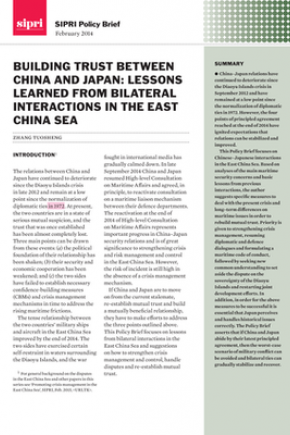Building Trust between China and Japan: Lessons Learned from Bilateral Interactions in the East China Sea
China–Japan relations have continued to deteriorate since the Diaoyu Islands crisis in September 2012 and have remained at a low point since the normalization of diplomatic ties in 1972. However, the four points of principled agreement reached at the end of 2014 have ignited expectations that relations can be stabilized and improved.
This Policy Brief focuses on Chinese–Japanese interactions in the East China Sea. Based on analyses of the main maritime security concerns and basic lessons from previous interactions, the author suggests specific measures to deal with the present crisis and long-term differences on maritime issues in order to rebuild mutual trust. Priority is given to strengthening crisis management, resuming diplomatic and defence dialogues and formulating a maritime code of conduct, followed by seeking new common understanding to set aside the dispute on the sovereignty of the Diaoyu Islands and restarting joint development efforts. In addition, in order for the above measures to be successful it is essential that Japan perceives and handles historical issues correctly.
The author believes that if China and Japan abide by their latest principled agreement, then the worst-case scenario of military conflict can be avoided and bilateral ties can gradually stabilize and recover. Such a development will not only serve the fundamental and long-term interests of the two countries, but also peace and development in the region and the world at large.

